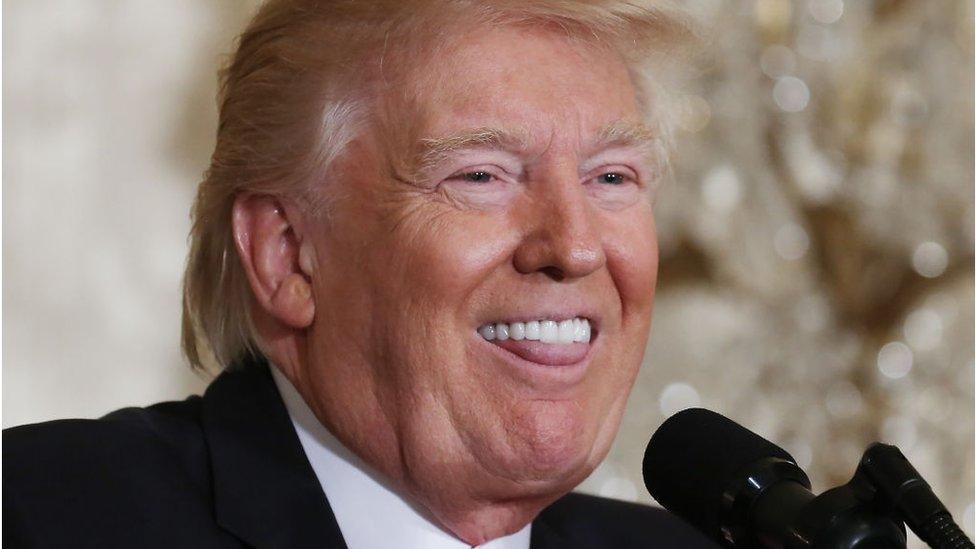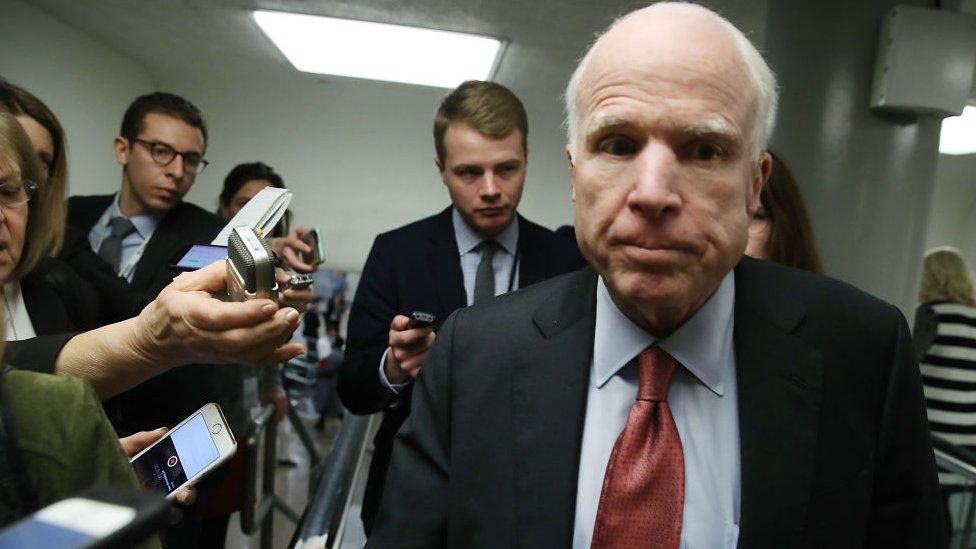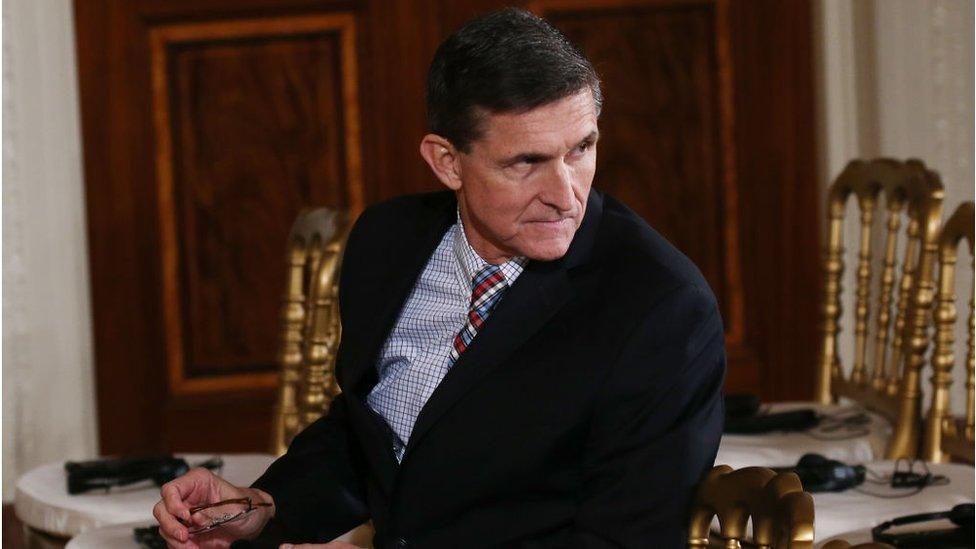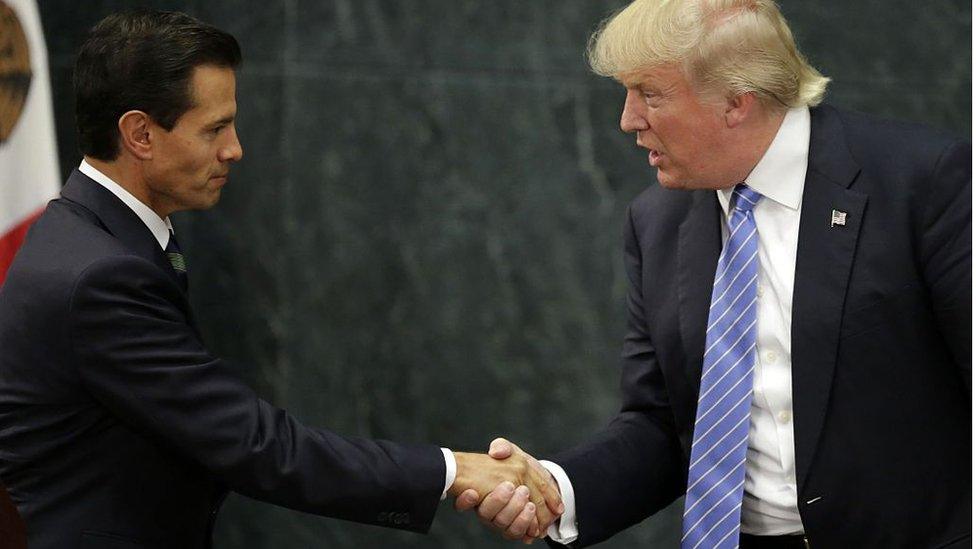What's next after one month of Trump drama
- Published

Four weeks. Twenty-eight days. It feels like 280 days. I feel 280. If Donald Trump is exhausting even the news-hungry political journalists, I wonder what he is doing to the rest of the world.
For the first three weeks I started the day repeating a mantra, "watch what he does, not what he says." I've discarded that notion. What Mr Trump says and how he says it is an important part of his presidency. His rhetoric, both in person and Twitter, appeals to his supporters. It's new and fresh and irreverent. But one day it could also be his undoing. He is increasingly losing respect among key Republicans, and he needs them to govern effectively.
Trump's busy first month in 90 seconds
This is my fourth American administration and we've never seen anything like it for sheer non-stop drama. Lewinsky was a daily feast of slightly prudish titillation, but it was one story line, and in the end it was just sex. 9/11 was far more serious and scary, and the ramifications lasted far beyond that fateful morning. But in a way it was a more conventional (though nonetheless horrifying) story of geopolitics and ideology. We journalists knew how to cover them both.

John McCain has been a Republican critic of Trump
Sometimes now, I admit, I'm at a loss. There is so much to say and think, and even feel, about the Trump administration that I find myself curiously stuck for words.
What's the most important story here? Is the psychodrama of a president who is both fantastically confident and oddly insecure, who publicly lashes out those who offend him and rewards those who please him? Is it the hard right turn he plans for America? Is it Russia, the curious crush Donald Trump seems to have on Vladimir Putin and what that might mean for global security? Is it America's allies, floundering in the face of this unpredictability?
Four long long weeks ago, we speculated that this may become a normal presidency, hemmed in by the restrictions of US institutions and the customs of US political tradition. We were wrong, again.

Michael Flynn resigned as National Security Advisor
Yes, Mr Trump has seen his agenda slowed, either by the structures of government or the realities of diplomacy. On five major national and international issues. he has either rowed back or been checked.
In a long overdue phone call with Xi Jinping he gave up toying with the one China policy.
In a conversation with a top EU official, members of his administration said Mr Trump would not tear up the Iran nuclear deal even though, in the President's words, it is the worst deal America has ever made.
In a statement the White House urged the Israelis to stop building new settlements in the West Bank.
A judge in Seattle and an appeals court in San Francisco have halted his immigration ban, at least for now.
Repealing Obamacare "on day one" did not happen - a recognition that without a replacement the slogan was just that, a slogan.
That's how government functions. Even this White House, with its ambition of rapid change, has been forced to bow somewhat to business as normal. Especially on foreign policy, there is actually little difference today between the Obama and Trump policies.
Trump voters say US president is 'doing a fabulous job'
But in other more profound ways this administration is anything but normal - which is precisely what Mr Trump's voters wanted.
For a start, the president himself breaks the rules. He berates allies (Australia, Mexico,) praises despots (notably, and most worryingly, Putin) and he has dropped the filter of "behaving presidentially." His Twitter attacks on the press, the intelligence services and individual Senators feel more schoolyard than Oval Office.
There is so much personal drama in his early morning tirades that I wake up anxious wondering who is it today and what does it all mean? But his supporters didn't send him to Washington to play nice. All the polls suggest they still really like what they see.
Where do Donald Trump supporters get their news from?
That his White House acts like some medieval court is not really so unusual. Jockeying for power has been a long tradition of US administrations. But it doesn't usually play out on the front pages of the newspaper. It also doesn't usually lead to the firing of one senior official within the first month and his potential replacement turning down the job because he fears being tainted by the dysfunction.
Whatever the president may say, that is not normal and it is not a well-oiled machine.

Candidate Trump met with Mexican president Pena Nieto during the campaign
Then there's the issue of what to believe. We've never seen an administration where one official says one thing publicly and the president says another. On the two state solution, the firing of General Flynn and Russian interference in the election, this week alone saw a string of public contradictions.
It is hard to see how this is sustainable. A lot is not getting done because of the administration chaos. There is still no tax reform bill, no Obamacare replacement, no infrastructure spending plan - all things he planned to do immediately.
It is also hard to see how it ends. President Trump appears to like the chaos theory of government and it fits his narrative of change.
Four weeks in, his approval ratings are not great but they're not disastrous. The most reliable national poll, by one of the few truly non-partisan organisations left in America, Pew Research, has him at 39%. That's lower than his predecessors at this stage but it's not through the floor.
In twenty years in Washington, I've never heard so much talk of the possibility of a President not finishing his term, even in the late 90s at the height of Clinton's Lewinsky scandal. But for that to happen there are only two options, Mr Trump would have to resign or be impeached. For the moment neither of those look at all likely.